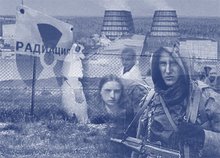WASHINGTON, D.C. – U.S. Secretary of Energy Samuel W. Bodman and Russian Federal Atomic Energy Agency (Rosatom) Director Sergey Kiriyenko today submitted to Presidents Bush and Putin the fifth report on nuclear security cooperation between the two countries. The report is known as the Bratislava Report after the 2005 historic nonproliferation agreement between the two presidents. It details significant work completed by the United States and Russia over the past six months in the areas of emergency response, nuclear security procedures and best practices, security culture, research reactors, and nuclear site security.
“This latest report clearly shows that our joint efforts with Russia to secure and minimize the use of highly enriched uranium in research reactors are making the world safer,” Secretary Bodman said. “We are seeing steady progress on converting the world’s research reactors from using highly enriched uranium to using low enriched uranium that cannot be readily used in a nuclear weapon. In addition, work to improve security at facilities with nuclear material will be completed by 2008.”
The report, which is delivered to each president two times a year, highlights discussions between the two countries on preparing for nuclear emergencies and developing a strong nuclear security culture. It also includes information about upcoming work to convert a research reactor in Vietnam so that the highly enriched uranium can be returned to Russia. It highlights future efforts to return Russian-origin highly enriched uranium from Poland, Kazakhstan, Hungary, Libya, Serbia, and the Czech Republic. The successful return of over 80 kilograms of United States-origin highly enriched uranium from Australia and Japan is noted in the report.
One of the key aspects of the Bratislava agreement two years ago was the adoption of an accelerated schedule for upgrading security at sites with nuclear material in Russia. The report reaffirms each country’s commitment to the accelerated completion schedule and also highlights the recent Rosatom agreement regarding the sustainability of the U.S.-installed security upgrades.
During the 2005 meeting in Bratislava, U.S. President Bush and Russian President Putin committed both governments to securing nuclear weapons and material to prevent the possibility that such weapons or materials could fall into the hands of terrorists. The presidents established a group of senior officials to work together on nuclear security issues who would report the status of cooperation to the presidents. The next report is due in December 2007.
Established by Congress in 2000, NNSA is a separately organized agency within the U.S. Department of Energy responsible for enhancing national security through the military application of nuclear science. NNSA maintains and enhances the safety, security, reliability and performance of the U.S. nuclear weapons stockpile without nuclear testing; works to reduce global danger from weapons of mass destruction; provides the U.S. Navy with safe and effective nuclear propulsion; and responds to nuclear and radiological emergencies in the United States and abroad. Visit the National Nuclear Security Administration homepage for more information.

